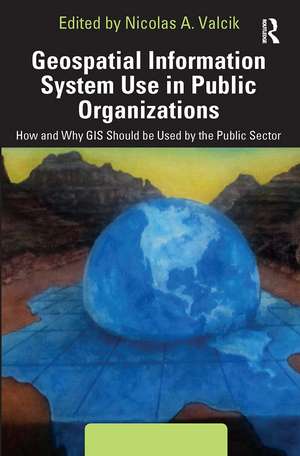Geospatial Information System Use in Public Organizations: How and Why GIS Should be Used in the Public Sector
Editat de Nicolas A. Valciken Limba Engleză Paperback – 21 ian 2023
| Toate formatele și edițiile | Preț | Express |
|---|---|---|
| Paperback (1) | 198.01 lei 6-8 săpt. | |
| Taylor & Francis – 21 ian 2023 | 198.01 lei 6-8 săpt. | |
| Hardback (1) | 846.89 lei 6-8 săpt. | |
| Taylor & Francis – oct 2019 | 846.89 lei 6-8 săpt. |
Preț: 198.01 lei
Preț vechi: 245.16 lei
-19% Nou
Puncte Express: 297
Preț estimativ în valută:
37.89€ • 41.29$ • 31.93£
37.89€ • 41.29$ • 31.93£
Carte tipărită la comandă
Livrare economică 23 aprilie-07 mai
Preluare comenzi: 021 569.72.76
Specificații
ISBN-13: 9781032475257
ISBN-10: 1032475250
Pagini: 286
Ilustrații: 76
Dimensiuni: 152 x 229 x 19 mm
Greutate: 0.39 kg
Ediția:1
Editura: Taylor & Francis
Colecția Routledge
Locul publicării:Oxford, United Kingdom
ISBN-10: 1032475250
Pagini: 286
Ilustrații: 76
Dimensiuni: 152 x 229 x 19 mm
Greutate: 0.39 kg
Ediția:1
Editura: Taylor & Francis
Colecția Routledge
Locul publicării:Oxford, United Kingdom
Public țintă
Professional Practice & DevelopmentCuprins
Foreword. Acknowledgments. About the Editor. About the Authors. Section I: Introduction 1. Introduction. Section II: Academic and Theoretical Research GIS Topics 2. Hurricane Rita’s Impact on Vegetation: A Spatio-Temporal Statistical Approach to Characterizing Abrupt Change in, and Potential Disaster Management for, Target Areas. 3. Evolving Trajectories in Public Sector Statewide Spatial Data Infrastructure: From Data Product to On-Demand Services and GIS Apps. 4. Using Geospatial Information Systems to Preposition Logistics in Preparation for Hazardous Materials Incidents for Disaster Response and Homeland Security Purposes. 5. Fire Disturbance and Implications for Ecosystem Services Distribution in Northern Amazonia. 6. Understanding Threats to Crowdsourced Geographic Data Quality Through a Study of OpenStreetMap Contributor Bans. Section III: Applied Research Using GIS 7. More Than Meets the Eye: The Methodological and Epistemological Hazards of GIS Map Use in the Public Sphere. 8. Protecting Surface Water Drinking Supplies in WV With Zones of Critical Concern. Section IV: Practitioner Use of GIS in Public and Nonprofit Organizations 9. Uses of Geospatial Information Systems (GIS) for Public Higher Education Institutions. 10. The Logistical Tracking System (LTS) Eighteen Years Later: What Did We Learn and What Could We Improve? 11. Trends and Challenges for Geographic Information Systems (GIS) Use by Nonprofits. 12. West Virginia Trail Inventory. 13. One Government: The Enterprise Approach in a Silo Environment. 14. GIS Practices for Best-Run County Governments. 15. Using GIS for Enrollment Management and Campus Management at a Public University. Section V: Conclusion 16. Conclusion. Index.
Recenzii
“This book by Dr. Nick Valcik and his colleagues outlines how GIS information is being used every day to help the public sector to save money, be more effective, to allow citizens to get answers without having to speak to a public servant, and to facilitate community engagement. The authors have clearly demonstrated that GIS Systems help public sector entities to help themselves and the people they serve.”
Teodoro Benavides
“The edited book brings top researchers in the field of Geospatial Information Systems (GIS) to discuss the importance and implications of this powerful tool, and its usage in the public and nonprofit sectors. The text fills a much-needed gap in public administration where GIS is not discussed regularly in classrooms, mainly due to the lack of expertise and availability of a good textbook. The topics in this text range from the usage of GIS in decision-making on issues of public health to hazard analysis, environment, public education, service delivery for nonprofits, and effective running of local governments. The interdisciplinary nature of this book makes it an excellent resource for scholars and practitioners of GIS, policymaking, urban planning, and public and nonprofit management.”
Meghna Sabharwal, The University of Texas at Dallas, USA
Teodoro Benavides
“The edited book brings top researchers in the field of Geospatial Information Systems (GIS) to discuss the importance and implications of this powerful tool, and its usage in the public and nonprofit sectors. The text fills a much-needed gap in public administration where GIS is not discussed regularly in classrooms, mainly due to the lack of expertise and availability of a good textbook. The topics in this text range from the usage of GIS in decision-making on issues of public health to hazard analysis, environment, public education, service delivery for nonprofits, and effective running of local governments. The interdisciplinary nature of this book makes it an excellent resource for scholars and practitioners of GIS, policymaking, urban planning, and public and nonprofit management.”
Meghna Sabharwal, The University of Texas at Dallas, USA
Notă biografică
Nicolas A. Valcik currently works as the Director of Institutional Research and Business Intelligence at the University of Texas at Permian Basin. Previously, Nicolas worked as the Executive Director for Institutional Effectiveness at Central Washington University, the Director for Institutional Research for West Virginia University, and as Associate Director of Strategic Planning and Analysis for the University of Texas at Dallas. In addition, Nicolas held an academic appointment as a Clinical Assistant Professor for Public Affairs for the University of Texas at Dallas. Prior to 1997, Nicolas worked for a number of municipalities, across different departments, as well as for Nortel. Nicolas received a doctorate in public affairs from the University of Texas at Dallas in 2005, a master’s in public affairs from the University of Texas at Dallas in 1996, a bachelor’s degree in interdisciplinary studies from the University of Texas at Dallas in 1994, and an associate’s degree in political science from Collin County Community College in 1994.
Descriere
This book shows how Global Information Systems (GIS) can be used for operations management in public institutions.
